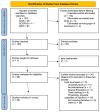A Systematic Review of Co-Educational Models in School Handball
- PMID: 34769954
- PMCID: PMC8582662
- DOI: 10.3390/ijerph182111438
A Systematic Review of Co-Educational Models in School Handball
Abstract
This study aims to address the characteristics presented by the co-educational models that have been put into practice in school handball, showing a general overview, after providing a systematic review of the literature on the topic published over the last ten years on co-educational paradigms in the practice of handball as a school sport. For the description and recording of the process of selection and filtering of documentary sources to be analyzed, use was made of the PRISMA flowchart. After the elimination of duplicates and entries not compliant with the criteria for time limits and type of document, the final sample surveyed was composed of thirty academic articles. The results considered (n = 26) showed a presentational pattern divisible into three segments or groups. These were: technical and sporting aspects of handball, highlighting the benefits of this sport in schools relative to other options (n = 7), co-education (n = 8), and results based on differences between the sexes (n = 11). Co-education stresses significant improvements in skills, together with perceived effort, enjoyment, and participation. These lead to improvements in the social climate and group cohesion, thanks to the practice of sports. Handball within schools, seen from a co-educational angle, should be approached with an eye to its predisposition for the development of social and civic skills. These include respect for the rules of a game, teamwork and solidarity, fair play, commitment, and responsibility. This paper lays out precisely and exhaustively the lines of investigation undertaken in the area of co-education, and, more specifically, how this is handled within the practicing of a confrontational team sport like handball.
Keywords: gender; handball; inclusion; physical education; sport.
Conflict of interest statement
The authors declare no conflict of interest.
Figures




References
-
- Franco M.T.B., Martín I.M., García M.B. Coeducar hoy. Reflexiones desde las pedagogías feministas para la despatriarcalización del curriculum. Tend. Pedagóg. 2019;34:37–50. doi: 10.15366/tp2019.34.004. - DOI
-
- Hills L.A., Croston A. ‘It should be better all together’: Exploring strategies for ‘undoing’ gender in coeducational physical education. Sport Educ. Soc. 2012;17:591–605. doi: 10.1080/13573322.2011.553215. - DOI
-
- Comisión Económica para América Latina y el Caribe (CEPAL) Planes de Igualdad de Género en América Latina y el Caribe: Mapas de Ruta para el Desarrollo, Observatorio de Igualdad de Género en América Latina y el Caribe. Estudios, No 1 (LC/PUB.2017/1-P/Rev.1) 2019. [(accessed on 26 October 2021)]. Available online: https://repositorio.cepal.org/bitstream/handle/11362/41014/6/S1801212_es....
-
- European Commission Strategic Engagement for Gender Equality: 2016–2019. 2015. [(accessed on 26 October 2021)]. Publications Office of the European Union. Available online: https://ec.europa.eu/anti-trafficking/eu-policy/strategic-engagement-gen....
-
- European Commission Gender Equality Index 2017: Measuring Gender Equality in the European Union 2005–2015—Report. 2017. [(accessed on 26 October 2021)]. European Institute for Gender Equality. Publications Office of the European Union. Available online: https://eige.europa.eu/sites/default/files/documents/20177277_mh0517208e....
Publication types
MeSH terms
LinkOut - more resources
Full Text Sources

